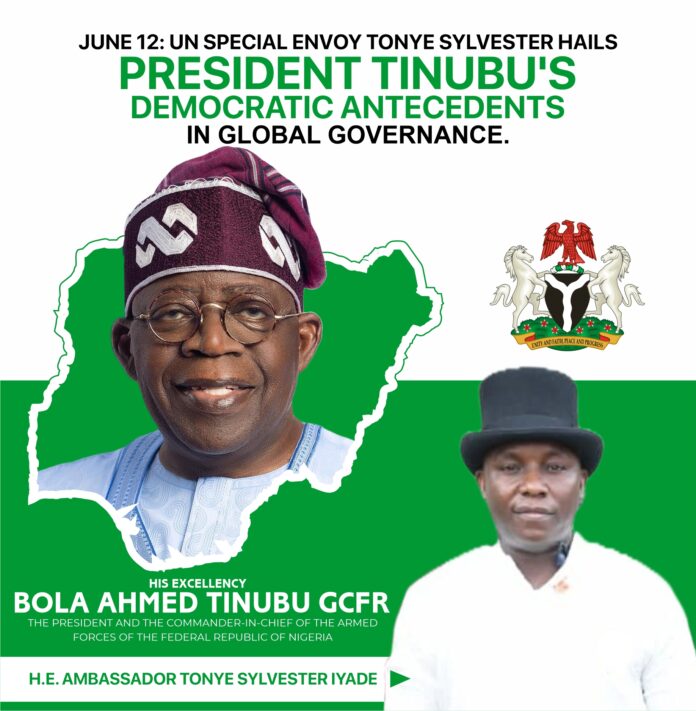As Nigeria commemorates Democracy Day on June 12, United Nations Special Envoy, Ambassador Tonye Sylvester Iyade, has paid glowing tribute to President Bola Ahmed Tinubu’s enduring legacy as a democrat and statesman, applauding his longstanding commitment to democratic values and his growing influence in shaping global governance conversations.
In a diplomatic communiqué released from his office in Abuja, Ambassador Sylvester described President Tinubu as “a pivotal figure whose democratic antecedents have not only shaped the Nigerian political landscape but have also positioned him as a key voice in promoting inclusive governance and rule of law across the African continent.”
“June 12 is a symbolic day for Nigeria, and indeed for Africa, marking the triumph of the people’s will over autocracy,” Ambassador Sylvester stated. “It is also a day to recognize those who stood firmly for democracy in its darkest hours. President Tinubu’s unwavering commitment during the pro-democracy struggle of the 1990s and his ongoing contributions to democratic leadership reflect the very essence of what this day represents.”
As a prominent opposition leader during Nigeria’s military era, President Tinubu was one of the key figures in the National Democratic Coalition (NADECO), risking personal freedom to uphold the sanctity of the June 12, 1993 presidential election—widely regarded as Nigeria’s most credible election. His activism, political resilience, and dedication to civil rights contributed to the eventual restoration of democracy in 1999.
Ambassador Sylvester noted that Tinubu’s transition from an activist to a national leader and now a President has demonstrated the vital role that principled leadership can play in rebuilding institutions, strengthening democratic norms, and fostering regional stability.
“President Tinubu’s political journey is emblematic of a leadership model rooted in service, accountability, and reform,” Sylvester continued. “He has remained an advocate for good governance, economic resilience, and regional cooperation, and his voice increasingly echoes in global policy dialogues concerning democracy, development, and peace.”
The UN envoy also highlighted Tinubu’s ongoing efforts to enhance Nigeria’s global image, especially through diplomatic engagements and regional leadership roles within ECOWAS and the African Union. Under Tinubu’s leadership, Nigeria has reaffirmed its place as a leading voice in continental affairs, championing democratic transitions and conflict resolution in neighboring states.
Ambassador Sylvester emphasized the importance of leveraging historical experiences such as June 12 to foster democratic consolidation and inclusive governance worldwide. He urged younger generations to study the sacrifices of the past and draw inspiration from figures like Tinubu who have demonstrated courage, vision, and tenacity in the face of authoritarianism.
“In an era of rising global uncertainty and democratic backsliding, leaders who embody consistency in democratic ideals are more vital than ever,” he added. “Nigeria’s journey, and President Tinubu’s story within it, offer invaluable lessons to the world.”
June 12 remains a cornerstone of Nigeria’s democratic identity—a day that honors both the memory of the late Chief M.K.O. Abiola and the countless citizens who championed electoral justice. As the nation marks this day, the words of Ambassador Sylvester serve as a diplomatic reminder of Nigeria’s democratic contributions on the world stage and the responsibility to nurture them for generations to come.





